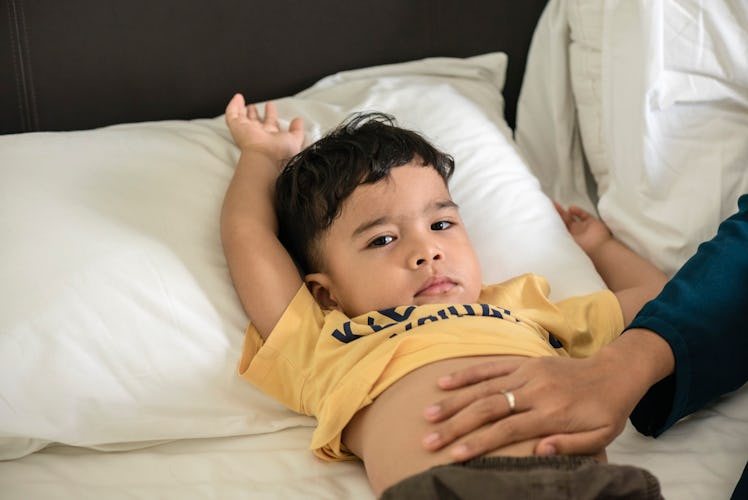How To Get Rid Of A Tummy Ache In Kids And Toddlers
Practical guidance for dealing with the inevitable complaint of tummy troubles.

As consistent as it is mysterious, the tummy ache is one of the most common complaints parents have to troubleshoot with their children. With any number of causes, it can be tough for parents to differentiate between a toddler tummy ache that will pass and one that requires medical attention. So how do you find a tummy ache remedy when you can’t see the problem and a kid probably can’t define it with specificity?
How Bad Is My Kid’s Tummy Ache?
Since kids can have a hard time providing accurate descriptions of their stomach pain, parents may need to rely on their observational skills to gauge how bad the pain is. “It is important to get some of those observational clues to understand how they feel,” says Christina Johns, M.D., Senior Medical Advisor for PM Pediatrics. “Are they still able to be playful? Or are they doubled over on the couch?”
Jay Fong, M.D., a pediatric gastroenterologist at UMass Memorial Medical Center adds that trying to engage your child can help you determine the general intensity of the pain. “If it’s so extreme that you can’t distract the child with conversation, or a change of topic or activity, then that is a severe pain that cannot be ignored.”
Another important clue for parents is whether or not the child has any symptoms accompanying their tummy ache. Johns notes that in addition to diarrhea or vomiting, parents should also look for a fever, sore throat, or cough because those are associated symptoms that parents don’t necessarily connect with tummy aches. “There are some causes of stomach pain in children that aren’t primarily an abdominal diagnoses, like strep throat, or pneumonia,” she says.
Older kids may be able to answer questions about their pain, but it’s important to make your questions specific. Older kids may be more helpful in pointing out where in the abdomen they’re experiencing pain and if it’s localized to one specific area. “Beyond that, what I like to ask kids who come in is if it is hurting all the time,” Johns says. “And I like to ask, ‘Is there anything that makes it feel better?’ And some kids will say, ‘Oh, well, yeah, it’s better after I go to the bathroom.’ I mean, that’s kids for you, right?”
In Fong’s experience, the most common reasons for kids to complain of tummy aches are largely benign. “Sometimes they are trying to get out of something they’ve been asked to do,” he says. “But true ailments can include some constipation, indigestion, anxiety, or stress.”
How To Get Rid Of A Tummy Ache
Distraction can be a parent’s most effective card to play when their child has a tummy ache. Infants and toddlers often respond well to the same things that soothe them to sleep, including gentle rocking, carrying them around the room, white noise, or offering them a pacifier. Older kids may respond well to talking about activities they’re looking forward to.
But there are other, more physical solutions. “It’s almost never harmful to try a warm compress or to offer some liquid to sip on,” says Fong.
When Should I Contact A Doctor About My Kid’s Tummy Ache?
“I would say that the vast majority of pediatric GI specialists would always have parents trust their instincts,” says Fong. Consulting with medical professionals at their pediatrician’s office or the nearest hospital is helpful because providers know which questions to ask to ascertain the appropriate level of medical care for your child. “We almost would always prefer that parents call us for a benign case of abdominal pain than to miss a potentially catastrophic cause for abdominal pain.”
Johns starts to get concerned when a child is feeling so poorly that they are unable to go about their regular activity for more than a few hours. “Additionally, when abdominal pain is associated with vomiting, especially green or yellow vomiting — which we call bilious vomiting or bile — that’s always very concerning,” she says. “It needs to be addressed in some fashion medically, right away.”
While your kid is unlikely to have the words to accurately diagnose what’s causing a tummy ache themselves, parents still have a lot of clues to pass on to medical professionals. It’s a matter of keen observation and a little distraction to make tummy troubles disappear.
This article was originally published on